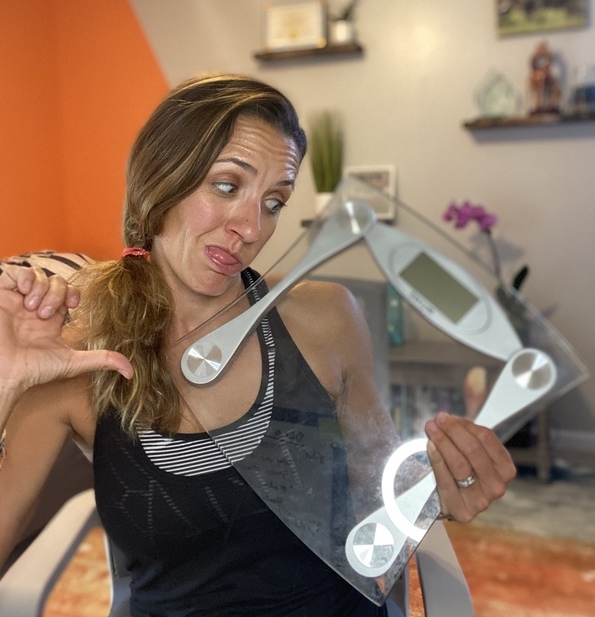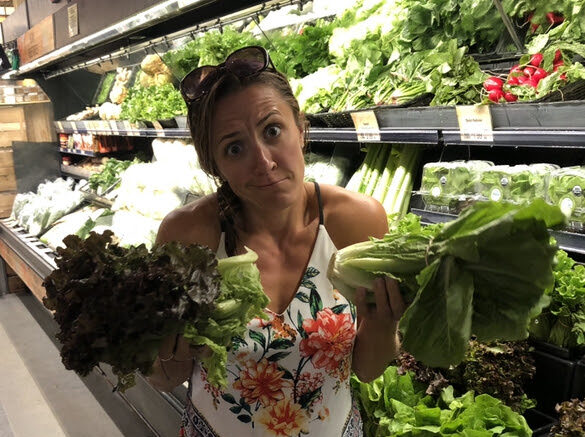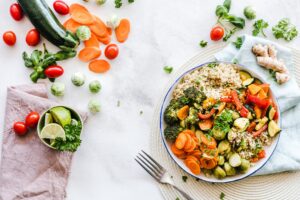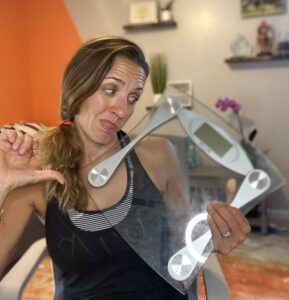On the surface weight loss is incredibly simple. Eat less, move more.
But for those of us who have ever spent a week eating salad only to find at the end of the week we weigh 2 pounds more than we started…we know it’s more complicated.
Sure, diet and exercise play a role, but so does metabolism, stress and sleep. And on any given day one of these may influence your weight more than others.
We’re about to take a deep dive into weight loss. We’ll explore the major factors that contribute to it, how these factors may be influenced by your actions, and how we can (because you actually can!) lose weight in a sustainable, healthy and meaningful way.

The utterly confusing simplicity of weight loss.
Here’s a question. When we lose weight, where does it go? You may think it evaporates or burns up as heat energy but that’s not actually the case.
When we need energy, our body breaks down fat to release the energy stored in the bonds in the fat molecule. This energy is then used by our body and we’re left with water (H2O) and carbon dioxide (CO2). Roughly 16% is excreted as water and 84% comes out as carbon dioxide in our breath.
Here’s the basic idea: C55H104O6 -> CO2 + H2O + energy
That arrow there? That arrow is weight loss.
So if the CO2 comes out through our breath, can we just breathe more and lose weight?
Nope. That’s called hyperventilation and it won’t go well. What we need to do is force our body to need more energy, thus it will break down fat molecules into H2O and CO2, and then our body can breathe out most of it (and pee out the rest!). This process is called metabolism.
The more fat we convert into energy, the more weight we will lose. See? Marvelously simple. But also ridiculously complex. My husband majored in biochemistry and spent 4 years in medical school and still struggles to explain that arrow.
Let’s talk metabolism.
Understanding a bit about metabolism (a.k.a. burning calories) is useful in determining how we’re going to exploit it for weight loss.
We burn calories in 3 ways.
1) Doing things to stay alive like breathing, pumping blood and controlling our body temperature. This is called our basal metabolic rate (BMR).
Our BMR makes up about 70% of our total calories burned! Just by sitting there we burn a ton of calories each day. Knowing your exact BMR requires testing, but it’s useful to estimate it. Insert your data below and see how many calories you burn each ay just by being alive!
2) Digesting food.
Our bodies use about 30% of the protein calories we eat just to digest the protein. Compare that with 10% for carbohydrates and 1% for fat (more on this later). In general: protein good, fat bad.
3) Moving our muscles.
Any movement burns calories. Fidgeting may burn up to 800 calories per day!
These three categories comprise our total daily calories used. If you consume fewer calories than that, you’ll lose weight. Consume more and you’ll gain weight. We already knew that. Eat less, move more. But with this basic understanding of metabolism we can become aware of how to exploit it.
How you eat less matters. For example, if you eat the same amount of protein rather than carbohydrates you’ll store fewer calories. How you move more matters too. This isn’t to say that using a fidget spinner and jogging a mile are equivalent. But it does say that we can all find small, sustainable changes that can lead to healthier lives.
As a health coach, my job is to help you exploit these opportunities in order to turn small, sustainable changes into huge results, simply by finding what works for you!
Pro tip: Your BMR increases the heavier you are. Take advantage of it!
Fast fat-burners and slow fat-burners.
We all have metabolisms that prefer to break down energy in different ways. You likely know people who can eat whatever they want without gaining much belly fat, while you may feel like you gain weight just by looking at a donut. You can’t hep about which source of energy your body prefers (it’s mostly genetic), but you can take advantage of that knowledge.
The Scale
When I begin to work with a new client who wants to lose weight, I typically ask them to take photos and measurements and to record their weight. For many, this is a terrible moment. One once remarked “I don’t want to do it, because it will tell me I’m obese.”
Once they get the data, they have to deal with it.
Don’t obsess over the scale!

Let’s think about it using an example.
Jill cuts her daily food calories by 200 calories and walks 2 miles a day, which uses an additional 200 calories. This is huge for her. She hasn’t walked that far in a looooong time. She feels great about herself, her self-esteem has increased, and her confidence is through the roof. This is an achievement worth celebrating because she’s making progress toward a healthier life.
Thing is though, it takes 3500 calories to burn 1 pound of fat. Her tremendous effort isn’t going to show up on the scale yet. In fact, she won’t lose a single pound for more than a week!
But she sticks with it for a year. Well that’s almost 150,000 calories, or nearly 42 pounds of fat that she’s lost! Imagine if she’d stopped after one week of “not making progress”.
Bottom line, focus on things other than the scale for a while. And when you hit a plateau, which happens to all of us, find other ways to know things are improving. Do your pants fit better? Maybe you reach to scratch your back and it doesn’t quite feel as squishy as it used to. Are you more confident? Is your endurance higher? There are so many ways to evaluate progress.
True weight loss comes from making small, sustainable changes and sticking with them.
Speaking of the weight loss plateau…
I hear it all the time. “My weight loss has plateaued”. While there’s some physiologic merit to the concept, it’s far more mental.
Daily and even weekly weight fluctuations are more often due to undigested food and water shifts than to diet and exercise. This is why it’s often easy to lose a few pounds in the first days of a diet. You get excited, you don’t put much in your stomach for the first couple of days, poop out what was already in there and voila! 3 pounds gone!
Through this sort of crash dieting you’re also consuming less salt which will cause you to pee out more water and look at that! Another 3 pounds! That’s 6 pounds in a week!
The problem is, it wasn’t fat that you burned, it was jettisoning undigested food waste and water. It will come right back as soon as you start eating again because, let’s face it, starvation diets can’t last forever.
And now it feels like you’ve “plateaud” when what really happened is that you didn’t burn much fat to begin with. Now every time you have a meal you’re adding undigested food and salt back into your body, which makes it appear you’re stuck at a weight.
’ll say it again, true weight loss is simply not a fast process. Find ways to measure your progress other than the scale.
Nutrition: “calories in”.
Nutrition and diet constitute the “calories in” part of the equation. But not all calories are created equal and there are tons of opportunities to exploit here!
Let’s use some of the most common questions I get asked about diet and nutrition to identify areas where we can take advantage of opportunities to make small, powerful, sustainable changes that will lead to permanent weight loss.
What’s the most common reason for eating too many calories?
We’re really, really bad at estimating how many calories we’ve consumed. When I have clients who are struggling with weight loss, I’ll often tell them that they can keep eating what they want, but they have to text me a photo of all their food before they eat it. Meals, snacks, everything. They hate this because the simple act of taking these photos helps them see just how much they’re actually eating.
When we truly think about portion size and the number of calories we consume, we usually underestimate it.
Next time you have a bowl of cereal, or handful of potato chips, or a bottle of soda, take a look at the serving size on the nutrition label. Chances are good you’re consuming more than one serving. In fact, I bet you’ll find you’re often eating 2 or 3 times more calories than you thought.
Accidental “binge eating” is also common. You may skip breakfast and lunch and then ravenously raid the fridge in the evening. It’s far easier than you think to consume 2000 calories in a few minutes.
Next time you have a bowl of cereal, or handful of potato chips, or a bottle of soda, take a look at the serving size on the nutrition label. Chances are good you’re consuming more than one serving. In fact, I bet you’ll find you’re often eating 2 or 3 times more calories than you thought.
What if I can’t (or don’t want to) change what I eat?
It is possible to make diet more about when you eat than what you eat. It’s called intermittent fasting, and it can fuel fat loss. It costs nothing, and can be great for people who have a hard time changing their diets. It’s also great for those who burn fat more slowly.
When we eat, insulin levels rise, which tells our bodies to store the food as sugar. But when we run out of storage space for sugar, we store the rest as fat. When it comes time to use energy, sugar is generally easier for our bodies to use, so we burn through our sugar reserves first. After about 12 hours, our sugar stores are used up and we begin to break down fat.
During intermittent fasting, you generally fast for 16 hours and eat for 8 hours (the “16:8 rule”). If it takes you 12 hours to burn through your sugar reserves after you stop eating, then that means you get 4 glorious hours where your body is only burning fat for energy!
What’s the difference between protein, carbohydrates and fat?
Without getting into biochemistry or the effect of these types of foods on our overall health (that’s for another time), the most important difference in these types of calories when it comes to weight loss is how much energy your body spends digesting them.
When you eat 100 calories of protein, you actually burn 30 calories converting it to sugar for storage. So you’ve only actually added 70 calories to your body. Carbohydrates are easier to store, so you only use 10 calories in the process and you gain 90 total calories. Fat is basically stored “as is” which uses almost no calories, and therefore nearly all 100 calories are gained.
It’s also worth noting that fat has more than twice as many calories in it than protein or carbohydrates. So not only do you burn fewer calories digesting it, but you consume more calories by eating it.
This fundamental difference in the types of calories we eat has led to the popularity of high protein, low carb diets over the last few years. The theory works like this.
First, protein regulates our appetite more than carbohydrates do, so protein makes us feel full. Second, our bodies burn more calories digesting protein than carbohydrates. Third, if we have fewer carbohydrates to use for energy, we’ll burn fat instead.
These diets can actually be helpful in weight loss. The problem comes when we confuse high protein, low carb with “I can eat anything I want as long as it’s not a carb”. Remember in The Office when Michael Scott got a sausage, egg and cheese breakfast sandwich and threw away the muffin so that it would be “healthier”?
These diets can actually be helpful in weight loss. The problem comes when we confuse high protein, low carb with “I can eat anything I want as long as it’s not a carb”. Remember in The Office when Michael Scott got a sausage, egg and cheese breakfast sandwich and threw away the muffin so that it would be “healthier”?
You can’t just eat whatever you want. Fat is still fat. No matter what your diet, you will only burn the calories that you need to, and any remaining fat will be stored as fat, causing weight gain.
High protein, low carb diets also need to be done carefully and likely short term. According to the Mayo clinic, long term risks may include heart and kidney disease.
Are there really good fats and bad fats?
Well, there are definitely bad fats. Here are the categories, so you know what to look for on food labels.
Trans fats: Bad. They lower the good cholesterol in your body and increase the bad cholesterol. You’ll find them in fast food, frozen pizza, stick margarine and baked goods.
Saturated fats: Not great but may be okay in moderation. Keep these <10% of your calories and even less if you’re trying to lose weight. They’re found in foods like cheese, red meat, 2% milk and butter.
Unsaturated fats: If you’re dieting but craving fat, these are a better choice and may actually decrease the bad cholesterol in your body. Think peanut butter, avocado, nuts, dark chocolate, salmon and olive oils. Diets like the “Mediterranean Diet” incorporate these fats for flavor and satiety.
How can I help prevent emotional eating?
We’ve all done had the experience of emotional eating. But why do we do it? Stress. We’ll get into that in a moment.
But here are a few quick tips to avoid emotional eating and mindless snacking.
- Be present. Listen to your body during and after eating and understand how it feels and how individual foods make it feel. This is called mindful eating.
- Get rid of electronics while eating. You’re body won’t register the meal and is more likely to be hungry again soon.
- Meal prep. You don’t have to go crazy, but setting aside your snacks for the day can keep you out of the fridge. Making a veggie tray and leaving it on the table all day can also be useful, you’ll gravitate toward those when walking through the kitchen because they’re right there (that’s also a trick I use to get my kids to eat more veggies).
Why does everyone say to drink more water while dieting?
Since most of our daily fluid comes from eating rather than drinking, it’s easy to confuse thirst with hunger. Doctors in the hospital will often give patients more than 3 ounces per hour through an IV to keep them hydrated. Do you drink 72 ounces of water a day? If not, you may actually be thirsty rather than hungry, but your brain can’t tell the difference.
I often recommend to my clients that they drink a glass of ice water before eating or when they crave a snack. You’ll be surprised at how often that can suppress hunger, simply because your body was actually looking for hydration rather than calories. You’ll also burn some calories heating that ice water in your body.
More than half of our body weight is water, and shifts in water occur much more quickly than fat loss. Consuming less salt can dilute our blood and cause us to excrete more water. This will show up on the scale, but it’s not fat loss. Please don’t confuse it with the kind of weight loss you’re trying to achieve because, as we’ve already discussed, this can cause the “plateau” effect that has resulted in so many people quitting weight loss too early.
Stress: making “calories in” worse.
Stress just makes everything worse, doesn’t it? It impacts our weight too, so we have to incorporate it into any sustainable weight loss plan.
When we’re stressed, we produce cortisol. Cortisol controls our “fight or flight” response by breaking down our protein stores to produce glucose. See, from an evolutionary standpoint, when we’re stressed our body thinks it’s because we need to run from a lion, and we need glucose to run from the lion. So it raises our blood sugar.
The problem is, we’re not stressed because of a lion. We’re stressed from work, our relationships, social media, etc… So we don’t run from a lion and therefore we don’t burn that glucose. What happens to it? Our body stores it as fat. And not just any fat, but that visceral around-our-organs fat.
It gets worse. Our body then recognizes that some protein stores have been depleted, so what’s it do? It craves calories to replete it. It tells you you’re hungry, and you emotionally eat (see above). Next time you’re stressed and somehow find yourself walking to the fridge, that’s why.
So what can we do? Exploit the opportunity! If we know why stress causes weight gain, we can attack it!
First, when you’re stressed, exercise can help you burn that glucose you’ve been producing. Do something to run from that lion that your body thinks is there. Go for a run or walk, do some sit-ups, find something physical to do. Right now! Before your body turns that glucose into fat!
Second, engage in regular activities that help with your stress. For me, that’s yoga, calming music and spending time with family and away from my phone. Maybe for you it’s playing with your dog, answering emails so they don’t pile up, making time each week to call family and friends. If you’re having trouble finding something that works for you, schedule a free, casual conversation with me! I bet we can come up with a plan. That’s what health coaches are for!
For those looking for a little more, you aren’t alone. Work life balance and stress management is among the most common requests I receive for corporate presentations. Here’s a recent virtual health fair talk I gave on the topic.
Pro tip: Inflammation increases cortisol. When you hear about inflammation causing weight gain, it’s the same process. Another great reason to look into a health coach!
Poor sleep: an underestimated cause of additional “calories in”.
Did you know that poor sleep can have a substantial impact on your weight?
Research suggests that people who don’t get enough sleep are more likely to snack late at night (I mean, you’re awake and bored or anxious, right?), and more likely to make poor decisions about nutrition.
And you remember that cortisol hormone we just talked about? That rises when we don’t sleep enough, which causes us to store fat and makes losing fat that much more difficult. It actually gets even worse. Not sleeping enough causes your body to respond differently to another hormone called insulin, which (you guessed it!) causes you to store more fat.
So getting a good night’s sleep matters when it comes to losing weight. People often tell me how much work they’re putting into dieting, but they sleep poorly, so unbeknownst to them the dieting is not going nearly as well as it could.
Here are a couple, powerful ways I’ve found to improve sleep.
- Develop a routine. Have dinner at the same time each night. Brush your teeth, get the kids to bed and turn off electronics at the same time each night. This trains your brain to recognize when it’s time to start slowing down. Try a fragrant pillow spray (I use lavender!) to help your brain realize it is bedtime.
- Stretch before bed, maybe with some soft music. It’ll get you into the right mindset for sleep by helping you focus on your breathing rather than your stress.
- Talk to a health coach! A holistic approach to sleep can be incredibly successful but is often very difficult to design on your own.
Exercise: “calories out”.
If nutrition defines how many calories we store, exercise defines how many calories we use. Hopefully by now it’s become apparent that when we use more than we store, we lose weight. And when it comes to using calories, any movement is better than no movement.
Building muscle can play an important role in weight loss. Depending on your ability you may not focus on this right away, but at some point you will likely need some sort of muscle building program while dieting or you’ll break down your muscles to make energy. That’s why you see people on crash diets often end up looking frail. Your goal is lean but strong. And guess what? That extra muscle you build will increase your basal metabolic rate, so you get to burn more calories for free!
There’s so much exercise advice out there, how do we make sense of it? An exercise regimen is a fairly personal thing, and giving generic advice can be difficult. But there are a few things to know.
High interval intensity training (HIIT) can burn more calories than running on a treadmill because your body burns more calories when it is working extra hard.
And strength training can help you build muscle and, thus, burn more calories at rest.
An exercise regimen that incorporates all of these is likely the best way to get strong and lean, but also it’s completely unrealistic for most people who are just starting their weight loss journey.
If you’ve read to this point, you hopefully understand by now that sustainable weight loss is all about finding what works for you by exploiting the opportunities that the “calories in, calories out” concept provide us.
What I tell my clients is that the best exercise for weight loss is the exercise that you will do consistently! Maybe that’s taking a daily walk, for some we literally may start with a fidget spinner or a Rubik’s cube.
As a certified personal trainer, I can provide you an additional level of expertise and accountability when it comes to exercise. If you can if you’d like help getting started, or want an exercise regimen designed specifically for you just schedule a free call with me!
Conclusion
Sustainable weight loss isn’t about eating only salads and running 3 miles a day. It’s about exploiting all of the opportunities given to us by the calories in versus calories out concept. And there are so many areas to exploit. You can change the timing of eating, change types of calories consumed, change types of fats consumed, work on your stress, get better sleep, move however you can…
The great thing is, you don’t have to be perfect! Any improvement will help you. Weight loss is about more than dieting. It requires a holistic approach that combines a focus on nutrition, fitness, stress and sleep.
Not everyone can do that alone, which leads me to my final point.
Health coaching can provide a fantastic way for people struggling with weight loss to find someone who can help them develop a long term, successful strategy. If you go this route, make sure your coach cares about you and your goals and doesn’t apply a cookie cutter approach (i.e. just a 1-hour per week session). You are unique, with unique challenges and unique strengths and this requires a unique approach to every client. My personal coaching style is to supplement weekly private sessions with personal training sessions, live small group workout classes, and lots of texting and accountability.
So there you have it. Our WunsUponA complete guide to sustainable weight loss. Now you have the knowledge.
What will you do with it?
Here are a couple, powerful ways I’ve found to improve sleep.
It’s also worth noting that fat has more than twice as many calories in it than protein or carbohydrates. So not only do you burn fewer calories digesting it, but you consume more calories by eating it.





